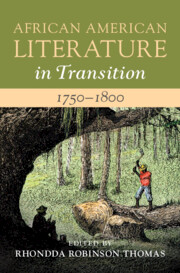Book contents
- African American Literature in Transition, 1750–1800
- African American Literature in Transition
- African American Literature in Transition, 1750–1800
- Copyright page
- Contents
- Contributors
- Preface
- Chronology
- Introduction
- Part I Limits and Liberties of Early Black Print Culture
- Chapter 1 Early Black Evangelical Writing and the Limits of Print
- Chapter 2 The Circulation of Early Black Atlantic Literature
- Chapter 3 What Makes a Text “Black”?
- Part II Black Writing and Revolution
- Part III Early African American Life in Literature
- Part IV Evolutions of Early Black Literature
- Index
Chapter 1 - Early Black Evangelical Writing and the Limits of Print
from Part I - Limits and Liberties of Early Black Print Culture
Published online by Cambridge University Press: 01 April 2022
- African American Literature in Transition, 1750–1800
- African American Literature in Transition
- African American Literature in Transition, 1750–1800
- Copyright page
- Contents
- Contributors
- Preface
- Chronology
- Introduction
- Part I Limits and Liberties of Early Black Print Culture
- Chapter 1 Early Black Evangelical Writing and the Limits of Print
- Chapter 2 The Circulation of Early Black Atlantic Literature
- Chapter 3 What Makes a Text “Black”?
- Part II Black Writing and Revolution
- Part III Early African American Life in Literature
- Part IV Evolutions of Early Black Literature
- Index
Summary
This chapter considers some of the earliest writers in the Black literary tradition in order to explore the limitations of print publication. Books by James Albert Ukawsaw Gronniosaw, Phillis Wheatley, and John Marrant were funded by proslavery British evangelicals associated with Selina Hastings, the Countess of Huntingdon. As she was publishing Black authors, Huntingdon also invested huge sums in the African slave trade and enslaved dozens of people on her plantation in Georgia. I argue that Huntingdon’s patronage helps explain troubling opinions about slavery voiced by the writers she promoted, most notoriously those in Wheatley’s “On Being Brought from Africa to America.” The chapter compares books like Wheatley’s with the writings of an unknown Black writer also associated with Huntingdon: the preacher David Margrett. Huntingdon funded Margrett on a missionary trip to Georgia but fired him after he gave a radical antislavery sermon declaring that “God will deliver his own people from slavery.” Margrett’s sermon survives only in private letters written by white people who sought to silence him. Comparing Margrett’s unpublished sermon with the books Huntingdon promoted illuminates the pressures Black authors strategically faced when they argued for their humanity in a medium controlled by white patrons.
Keywords
- Type
- Chapter
- Information
- African American Literature in Transition, 1750–1800 , pp. 17 - 41Publisher: Cambridge University PressPrint publication year: 2022
- 9
- Cited by

